- Home
- Connie Willis
The Best of Connie Willis Page 6
The Best of Connie Willis Read online
Page 6
The lights went down and the red curtains opened, revealing an inner curtain like a veil across the screen. I went down the dark aisle and sat down in one of the seats. “Hi,” I said, and handed the Raisinets to David.
“Where have you been?” he said. “The movie’s about to start.”
“I know,” I said. I leaned across him and handed Darlene her popcorn and Dr. Gedanken his Jujubes. “I was working on the paradigm for quantum theory.”
“And?” Dr. Gedanken said, opening his jujubes.
“And you’re both wrong,” I said. “It isn’t Grauman’s Chinese. It isn’t movies, either, Dr. Gedanken.”
“Sid,” Dr. Gedanken said. “If we’re all going to be on the same research team, I think we should use first names.”
“If it isn’t Grauman’s Chinese or the movies, what is it?” Darlene asked, eating popcorn.
“It’s Hollywood.”
“Hollywood,” Dr. Gedanken said thoughtfully.
“Hollywood,” I said. “Stars in the sidewalk and buildings that look like stacks of LPs and hats, and radicchio and audience surveys and bra museums. And the movies. And Grauman’s Chinese.”
“And the Rialto,” David said.
“Especially the Rialto.”
“And the ICQP,” Dr. Gedanken said.
I thought about Dr. Lvov’s black and gray slides and the disappearing chaos seminar and Dr. Whedbee writing “meaning” or possibly “information” on the overhead projector. “And the ICQP,” I said.
“Did Dr. Takumi really hit Dr. Iverson over the head with a gavel?” Darlene asked.
“Shh,” David said. “I think the movie’s starting.” He took hold of my hand. Darlene settled back with her popcorn, and Dr. Gedanken put his feet up on the chair in front of him. The inner curtain opened, and the screen lit up.
Afterword for “At the Rialto”
I wrote “At the Rialto” after an SFWA Nebula Awards Banquet weekend which actually featured many of the elements depicted in the story. It was held at the Roosevelt Hotel, which was right across the street from Grauman’s Chinese Theatre; we did go to the Bra Museum at Frederick’s of Hollywood, which has Madonna’s gold cone-shaped bra and Ethel Merman’s girdle; the desk clerk was a model/actress; and there were definitely signs of quantum effects occurring at a macrocosmic level. We did not, however, see Benji IX at the theater. We saw Willow. And we didn’t make it out to Forest Lawn.
But we had a great time. And what else can you expect from Hollywood? I adore the place. It’s so deliciously nutty. I mean, not only is every hotel clerk and waitress and valet car-parker an actor/something-or-other, but the trademark Hollywood sign up on the hill was actually an advertisement for a housing development called Hollywoodland till the last four letters fell over, and the shopping mall has rearing concrete elephants and a massive replica of the Babylon set for D. W. Griffith’s 1916 silent film Intolerance.
They named one of their cemeteries Hollywood Forever, and during the summer they project movies on the side of the mausoleum (I am not making this up), and the locals bring picnic baskets and sit on the grass among the graves of Douglas Fairbanks and Cecil B. DeMille and Jayne Mansfield.
And all those stories about crazy directors and clueless producers and pitch meetings are true. When they turned the Broadway play The Madness of King George III into a movie, they really did insist on changing the title to The Madness of King George because they were convinced the audience would otherwise think it was a sequel. You know, like Spider-Man 3.
How can you not love a place like that?
DEATH ON THE NILE
Chapter One: Preparing for Your Trip—What to Take
“ ‘To the ancient Egyptians,’ ” Zoe reads, “ ‘Death was a separate country to the west’ ”—the plane lurches—“ ‘the west to which the deceased person journeyed.’ ”
We are on the plane to Egypt. The flight is so rough the flight attendants have strapped themselves into the nearest empty seats, looking scared, and the rest of us have subsided into a nervous window-watching silence. Except Zoe, across the aisle, who is reading aloud from a travel guide.
This one is Somebody or Other’s Egypt Made Easy. In the seat pocket in front of her are Fodor’s Cairo and Cook’s Touring Guide to Egypt’s Antiquities, and there are half a dozen others in her luggage. Not to mention Frommer’s Greece on $35 a Day and the Savvy Traveler’s Guide to Austria and the three or four hundred other guidebooks she’s already read out loud to us on this trip. I toy briefly with the idea that it’s their combined weight that’s causing the plane to yaw and careen and will shortly send us plummeting to our deaths.
“ ‘Food, furniture, and weapons were placed in the tomb,’ ” Zoe reads, “ ‘as provi-’ ”—the plane pitches sideways—“ ‘-sions for the journey.’ ”
The plane lurches again, so violently Zoe nearly drops the book, but she doesn’t miss a beat. “ ‘When King Tutankhamun’s tomb was opened,’ ” she reads, “ ‘it contained trunks full of clothing, jars of wine, a golden boat, and a pair of sandals for walking in the sands of the afterworld.’ ”
My husband, Neil, leans over me to look out the window, but there is nothing to see. The sky is clear and cloudless, and below us there aren’t even any waves on the water.
“ ‘In the afterworld the deceased was judged by Anubis, a god with the head of a jackal,’ ” Zoe reads, “ ‘and his soul was weighed on a pair of golden scales.’ ”
I am the only one listening to her. Lissa, on the aisle, is whispering to Neil, her hand almost touching his on the armrest. Across the aisle, next to Zoe and Egypt Made Easy, Zoe’s husband is asleep and Lissa’s husband is staring out the other window and trying to keep his drink from spilling.
“Are you doing all right?” Neil asks Lissa solicitously.
“It’ll be exciting going with two other couples,” Neil said when he came up with the idea of our all going to Europe together. “Lissa and her husband are lots of fun, and Zoe knows everything. It’ll be like having our own tour guide.”
It is. Zoe herds us from country to country, reciting historical facts and exchange rates. In the Louvre, a French tourist asked her where the Mona Lisa was. She was thrilled. “He thought we were a tour group!” she said. “Imagine that!”
Imagine that.
“ ‘Before being judged, the deceased recited his confession,’ ” Zoe reads, “ ‘a list of sins he had not committed, such as, I have not snared the birds of the gods, I have not told lies, I have not committed adultery.’ ”
Neil pats Lissa’s hand and leans over to me. “Can you trade places with Lissa?” Neil whispers to me.
I already have, I think. “We’re not supposed to,” I say, pointing at the lights above the seats. “The seat belt sign is on.”
He looks at her anxiously. “She’s feeling nauseated.”
So am I, I want to say, but I am afraid that’s what this trip is all about, to get me to say something. “Okay,” I say, and unbuckle my seat belt and change places with her. While she is crawling over Neil, the plane pitches again, and she half-falls into his arms. He steadies her. Their eyes lock.
“ ‘I have not taken another’s belongings,’ ” Zoe reads. “ ‘I have not murdered another.’ ”
I can’t take any more of this. I reach for my bag, which is still under the window seat, and pull out my paperback of Agatha Christie’s Death on the Nile. I bought it in Athens.
“About like death anywhere,” Zoe’s husband said when I got back to our hotel in Athens with it.
“What?” I said.
“Your book,” he said, pointing at the paperback and smiling as if he’d made a joke. “The title. I’d imagine death on the Nile is the same as death anywhere.”
“Which is what?” I asked.
“The Egyptians believed death was very similar to life,” Zoe cut in. She had bought Egypt Made Easy at the same bookstore. “To the ancient Egyptians the afterworld was a place much like the world they inhab
ited. It was presided over by Anubis, who judged the deceased and determined their fates. Our concepts of heaven and hell and of the Day of Judgment are nothing more than modern refinements on Egyptian ideas,” she said, and began reading out loud from Egypt Made Easy, which pretty much put an end to our conversation, and I still don’t know what Zoe’s husband thought death would be like, on the Nile or elsewhere.
I open Death on the Nile and try to read, thinking maybe Hercule Poirot knows, but the flight is too bumpy. I feel almost immediately queasy, and after half a page and three more lurches I put it in the seat pocket, close my eyes, and toy with the idea of murdering another. It’s a perfect Agatha Christie setting. She always has a few people in a country house or on an island. In Death on the Nile they were on a Nile steamer, but the plane is even better. The only other people on it are the flight attendants and a Japanese tour group who apparently do not speak English or they would be clustered around Zoe, asking directions to the Sphinx.
The turbulence lessens a little, and I open my eyes and reach for my book again. Lissa has it.
She’s holding it open, but she isn’t reading it. She is watching me, waiting for me to notice, waiting for me to say something. Neil looks nervous.
“You were done with this, weren’t you?” she says, smiling. “You weren’t reading it.”
Everyone has a motive for murder in an Agatha Christie. And Lissa’s husband has been drinking steadily since Paris, and Zoe’s husband never gets to finish a sentence. The police might think he had snapped suddenly. Or that it was Zoe he had tried to kill and shot Lissa by mistake. And there is no Hercule Poirot on board to tell them who really committed the murder, to solve the mystery and explain all the strange happenings.
The plane pitches suddenly, so hard Zoe drops her guidebook, and we plunge a good five thousand feet before it recovers. The guidebook has slid forward several rows, and Zoe tries to reach for it with her foot, fails, and looks up at the seat belt sign as if she expects it to go off so she can get out of her seat to retrieve it.
Not after that drop, I think, but the seat belt sign pings almost immediately and goes off.
Lissa’s husband instantly calls for the flight attendant and demands another drink, but they have already gone scurrying back to the rear of the plane, still looking pale and scared, as if they expected the turbulence to start up again before they made it. Zoe’s husband wakes up at the noise and then goes back to sleep. Zoe retrieves Egypt Made Easy from the floor, reads a few more riveting facts from it, then puts it facedown on the seat and goes back to the rear of the plane.
I lean across Neil and look out the window, wondering what’s happened, but I can’t see anything. We are flying through a flat whiteness.
Lissa is rubbing her head. “I cracked my head on the window,” she says to Neil. “Is it bleeding?”
He leans over her solicitously to see.
I unsnap my seat belt and start to the back of the plane, but both bathrooms are occupied, and Zoe is perched on the arm of an aisle seat, enlightening the Japanese tour group. “The currency is in Egyptian pounds,” she says. “There are one hundred piasters in a pound.”
I sit back down.
Neil is gently massaging Lissa’s temple. “Is that better?” he asks.
I reach across the aisle for Zoe’s guidebook. “Must-See Attractions,” the chapter is headed, and the first one on the list is the Pyramids.
“Giza, Pyramids of. West bank of Nile, 9 mi. (15 km.) SW of Cairo. Accessible by taxi, bus, rental car. Admission L.E. 3. Comments: You can’t skip the Pyramids, but be prepared to be disappointed. They don’t look at all like you expect, the traffic’s terrible, and the view’s completely ruined by the hordes of tourists, refreshment stands, and souvenir vendors. Open daily.”
I wonder how Zoe stands this stuff. I turn the page to Attraction Number Two. It’s King Tut’s tomb, and whoever wrote the guidebook wasn’t thrilled with it, either. “Tutankhamun, Tomb of. Valley of the Kings, Luxor, 400 mi. (668 km.) south of Cairo. Three unimpressive rooms. Inferior wall paintings.”
There is a map, showing a long, straight corridor (labeled Corridor) and the three unimpressive rooms opening one onto the other in a row—Anteroom, Burial Chamber, Hall of Judgment.
I close the book and put it back on Zoe’s seat. Zoe’s husband is still asleep. Lissa’s is peering back over his seat. “Where’d the flight attendants go?” he asks. “I want another drink.”
“Are you sure it’s not bleeding? I can feel a bump,” Lissa says to Neil, rubbing her head. “Do you think I have a concussion?”
“No,” Neil says, turning her face toward his. “Your pupils aren’t dilated.” He gazes deeply into her eyes.
“Stewardess!” Lissa’s husband shouts. “What do you have to do to get a drink around here?”
Zoe comes back, elated. “They thought I was a professional guide,” she says, sitting down and fastening her seat belt. “They asked if they could join our tour.” She opens the guidebook. “ ‘The afterworld was full of monsters and demigods in the form of crocodiles and baboons and snakes. These monsters could destroy the deceased before he reached the Hall of Judgment.’ ”
Neil touches my hand. “Do you have any aspirin?” he asks. “Lissa’s head hurts.”
I fish in my bag for it, and Neil gets up and goes back to get her a glass of water.
“Neil’s so thoughtful,” Lissa says, watching me, her eyes bright.
“ ‘To protect against these monsters and demigods, the deceased was given The Book of the Dead,’ ” Zoe reads. “ ‘More properly translated as The Book of What Is in the Afterworld, The Book of the Dead was a collection of directions for the journey and magic spells to protect the deceased.’ ”
I think about how I am going to get through the rest of the trip without magic spells to protect me. Six days in Egypt and then three in Israel, and there is still the trip home on a plane like this and nothing to do for fifteen hours but watch Lissa and Neil and listen to Zoe.
I consider cheerier possibilities. “What if we’re not going to Cairo?” I say. “What if we’re dead?”
Zoe looks up from her guidebook, irritated.
“There’ve been a lot of terrorist bombings lately, and this is the Middle East,” I go on. “What if that last air pocket was really a bomb? What if it blew us apart, and right now we’re drifting down over the Aegean Sea in little pieces?”
“Mediterranean,” Zoe says. “We’ve already flown over Crete.”
“How do you know that?” I ask. “Look out the window.” I point out Lissa’s window at the white flatness beyond. “You can’t see the water. We could be anywhere. Or nowhere.”
Neil comes back with the water. He hands it and my aspirin to Lissa.
“They check the planes for bombs, don’t they?” Lissa asks him. “Don’t they use metal detectors and things?”
“I saw this movie once,” I say, “where the people were all dead, only they didn’t know it. They were on a ship, and they thought they were going to America. There was so much fog they couldn’t see the water.”
Lissa looks anxiously out the window.
“It looked just like a real ship, but little by little they began to notice small things that weren’t quite right. There were hardly any people on board, and no crew at all.”
“Stewardess!” Lissa’s husband calls, leaning over Zoe into the aisle. “I need another ouzo.”
His shouting wakes Zoe’s husband up. He blinks at Zoe, confused that she is not reading from her guidebook. “What’s going on?” he asks.
“We’re all dead,” I say. “We were killed by Arab terrorists. We think we’re going to Cairo but we’re really going to heaven. Or hell.”
Lissa, looking out the window, says, “There’s so much fog I can’t see the wing.” She looks frightenedly at Neil. “What if something’s happened to the wing?”
“We’re just going through a cloud,” Neil says. “We’re probably beginning our descent in
to Cairo.”
“The sky was perfectly clear,” I say, “and then all of a sudden we were in the fog. The people on the ship noticed the fog, too. They noticed that there weren’t any running lights. And they couldn’t find the crew.” I smile at Lissa. “Have you noticed the turbulence stopped all of a sudden? Right after we hit that air pocket. And why—?”
A flight attendant comes out of the cockpit and down the aisle to us, carrying a drink. Everyone looks relieved, and Zoe opens her guidebook and begins thumbing through it, looking for fascinating facts.
“Did someone here want an ouzo?” the flight attendant asks.
“Here,” Lissa’s husband says, reaching for it.
“How long before we get to Cairo?” I say.
She starts toward the back of the plane without answering. I unbuckle my seat belt and follow her. “When will we get to Cairo?” I ask her.
She turns, smiling, but she is still pale and scared-looking. “Did you want another drink, ma’am? Ouzo? Coffee?”
“Why did the turbulence stop?” I say. “How long till we get to Cairo?”
“You need to take your seat,” she says, pointing to the seat belt sign. “We’re beginning our descent. We’ll be at our destination in another twenty minutes.” She bends over the Japanese tour group and tells them to bring their seat backs to the upright position.
“What destination? Our descent to where? We aren’t beginning any descent. The seat belt sign is still off,” I say, and it bings on.
I go back to my seat. Zoe’s husband is already asleep again. Zoe is reading out loud from Egypt Made Easy. “ ‘The visitor should take precautions before traveling in Egypt. A map is essential, and a flashlight is needed for many of the sites.’ ”
Lissa has gotten her bag out from under the seat. She puts my Death on the Nile in it and gets out her sunglasses. I look past her and out the window at the white flatness where the wing should be. We should be able to see the lights on the wing even in the fog. That’s what they’re there for, so you can see the plane in the fog. The people on the ship didn’t realize they were dead at first. It was only when they started noticing little things that weren’t quite right that they began to wonder.

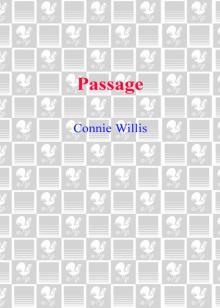 Passage
Passage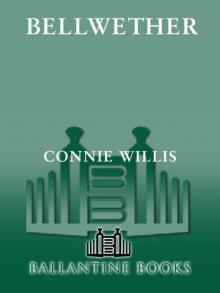 Bellwether
Bellwether Blackout
Blackout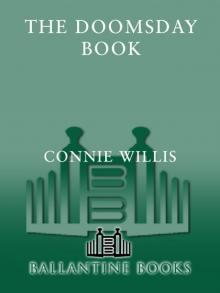 Doomsday Book
Doomsday Book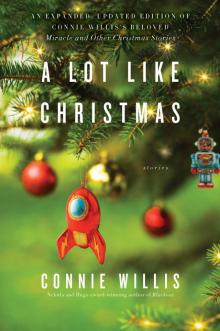 A Lot Like Christmas: Stories
A Lot Like Christmas: Stories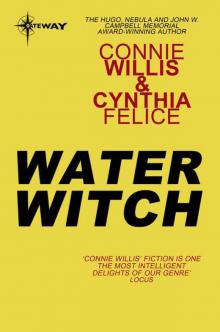 Water Witch
Water Witch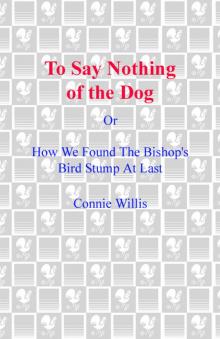 To Say Nothing of the Dog
To Say Nothing of the Dog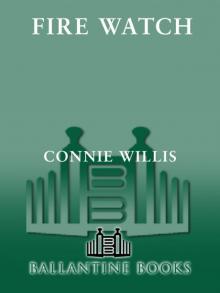 Fire Watch
Fire Watch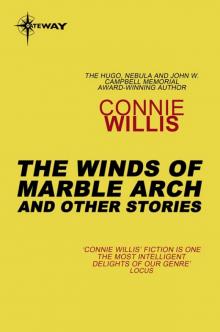 The Winds of Marble Arch and Other Stories
The Winds of Marble Arch and Other Stories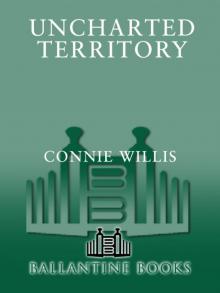 Uncharted Territory
Uncharted Territory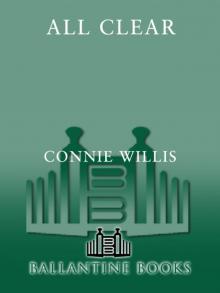 All Clear
All Clear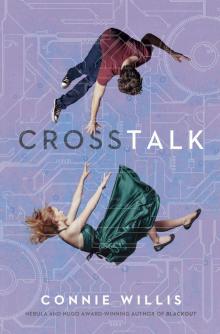 Crosstalk
Crosstalk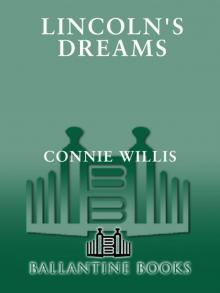 Lincoln's Dreams
Lincoln's Dreams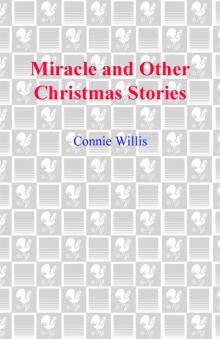 Miracle and Other Christmas Stories
Miracle and Other Christmas Stories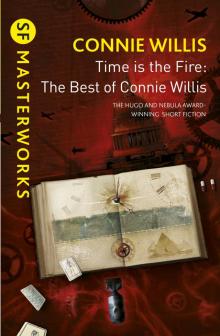 Time is the Fire
Time is the Fire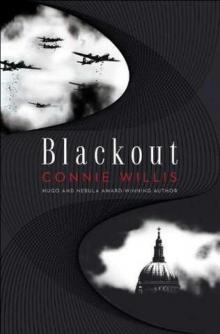 Blackout ac-1
Blackout ac-1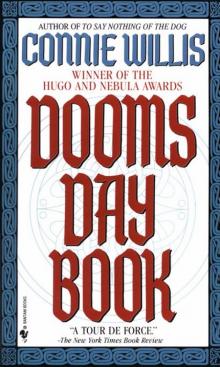 Dooms Day Book
Dooms Day Book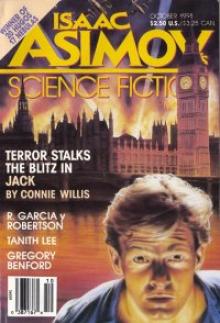 Jack
Jack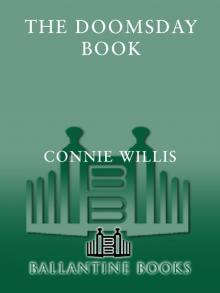 The Doomsday Book
The Doomsday Book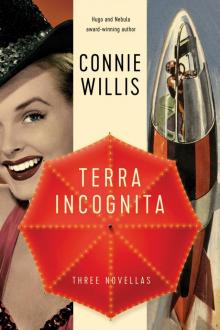 Terra Incognita
Terra Incognita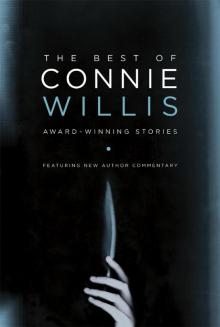 The Best of Connie Willis
The Best of Connie Willis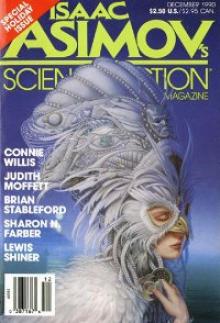 Cibola
Cibola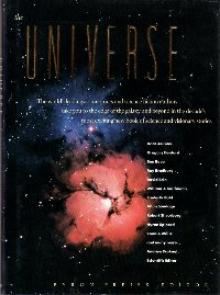 Schwarzschild Radius
Schwarzschild Radius Even the Queen
Even the Queen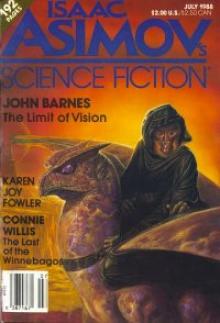 The Last of the Winnebagos
The Last of the Winnebagos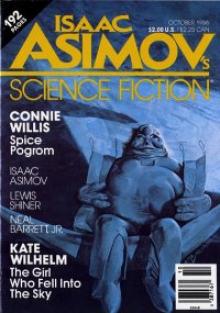 Spice Pogrom
Spice Pogrom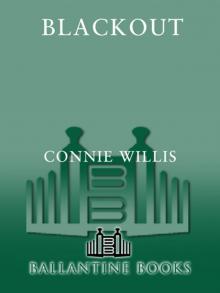 Oxford Time Travel 1 - Blackout
Oxford Time Travel 1 - Blackout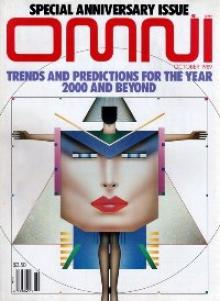 At The Rialto
At The Rialto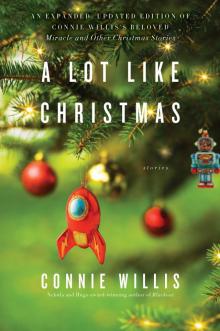 A Lot Like Christmas
A Lot Like Christmas